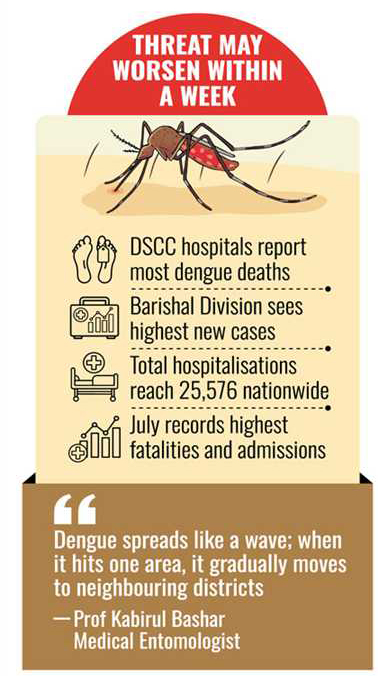

Entomologists have warned that Bangladesh could face a worsening dengue fever situation in the coming weeks as the ongoing monsoon rains across the country begin to subside.
While the rainfall currently washes away mosquito larvae and breeding habitats, persistent waterlogging -- exacerbated by inadequate cleaning and low public awareness -- remains common in both rural and urban areas, creating favourable conditions for Aedes mosquitoes to thrive.
The situation could start deteriorating within a week after the rains cease, experts told The Financial Express.
Prof Kabirul Bashar, a medical entomologist and teacher at Jahangirnagar University, said the weather would remain rainy for a few more days, but this year the dengue threat is expected to worsen outside Dhaka.
Alarmingly, Barishal division has recorded unusually high cases, surpassing even Dhaka's two city corporations, which traditionally report the highest hospitalisations.

Of the total new hospitalisations on Thursday, 65 came from Barishal. Prof Bashar attributed this surge to poor water management in the region.
Barguna, a district near Barishal, experienced a severe dengue outbreak in 2023, with a significant increase in cases and hospitalisations.
"Dengue spreads like a wave," Prof Bashar explained. "When it hits one area, it gradually moves to neighbouring districts. After Barguna, it is now hitting Barishal hard."
He linked the higher dengue density in Barishal to longstanding water management issues compounded by a shortage of potable water.
Southern and south-central coastal districts face a severe water crisis due to high salinity and polluted water, limiting access to safe surface or groundwater for daily use.
"Rivers, ponds, and groundwater contain intolerable levels of salinity and iron, making them unsuitable for drinking or cooking. As a result, people store rainwater or other potable water, which sometimes backfires by creating ideal breeding conditions for dengue mosquitoes," Prof Bashar explained.
According to the entomologist, these factors are major reasons for the higher number of dengue patients in Barishal.
He also criticised the region's outdated anti-dengue mechanisms and said repeated calls to update them have gone unheeded. Furthermore, weak local governance following last August has hindered a seamless anti-dengue drive in the countryside, breaking the chain of command essential for an effective campaign.
Meanwhile, hospitals in Dhaka South City Corporation (DSCC) areas are recording the highest number of deaths. Of the total 104 dengue-related fatalities this year, 47 occurred in DSCC hospitals.
Dr Nishat Parvin, chief health officer of DSCC, said the situation remains under control, citing year-round anti-dengue campaigns.
On the high number of deaths in DSCC hospitals, she clarified that most deceased patients were not DSCC residents but came from other parts of Dhaka and beyond.
"Hospitals in DSCC see more deaths because they admit patients from across the country," she said, urging continued cleaning efforts to ensure residents' safety.
In cooperation with the Directorate General of Health Services (DGHS), DSCC hospitals remain prepared to tackle any surge in cases.
According to DGHS, 252 people were hospitalised in the last 24 hours due to dengue, bringing the total hospitalisations this year to 25,576, including 51 patients in DSCC.
No new deaths were reported in the last 24 hours, keeping the death toll at 104 since January.
July recorded the highest fatalities this year, with 41 deaths, and also saw the highest number of hospitalisations, with 10,684 patients admitted.
In 2023, the country reported a record 1,705 deaths and 321,179 dengue cases, according to official statistics.
nsrafsanju@gmail.com


 For all latest news, follow The Financial Express Google News channel.
For all latest news, follow The Financial Express Google News channel.